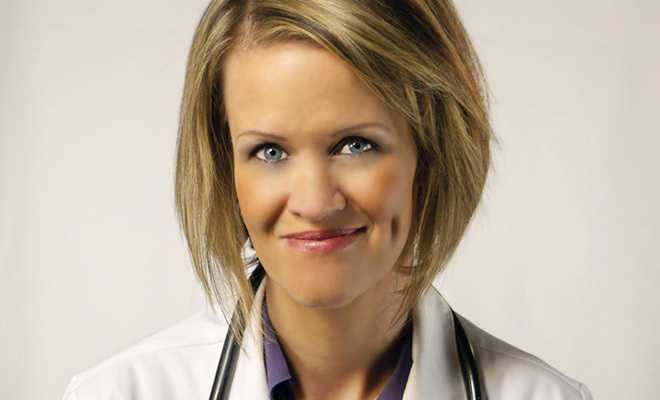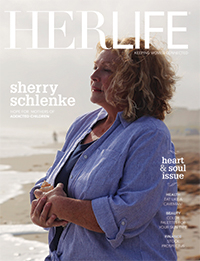
A Nurse Set to Change the World: Christina Oliva, ARNP
Christina Oliva, DNPc, AGNP-C, CCRN, vice president and adult/geriatric nurse practitioner for Trinity Healthcare Medical Center, is the face of caring in today’s medicine.
Born and raised in Ocala, Christina’s interests include her family and her Internal Medicine practice, where she is now a partner. Her family comes first. “Nothing is more important in my life than my family. I moved home to raise my children closer to my parents and siblings after living and training in South Florida for more than seven years,” she noted. “My passions are advocacy, healthcare and my relationship with God.”
Nursing has always come naturally to Christina, from the time she was a young child caring for her grandfather with Alzheimer’s disease. She always knew it was her calling. “I genuinely care for people and always want the best for them. I realized pretty quickly when I began nursing school in 2000 that I was fiercely passionate about both advocacy and health. I would go above and beyond for my patients and be as loud as I needed to be to have their needs addressed,” she asserted. “The single most important thing I do, even today, is to be a voice for someone when they do not have one.”
Making the decision to become an ARNP was easy for Christina. For more than ten years, she learned from some of the brightest medical doctors she had ever known from every specialty working in CCU/CVICU/MICU. She found herself understanding medicine and the human body on an entirely new level. She welcomed all that grad school and doctorate school could offer. She graduated in May 2013 at the top of her class and scored among the highest in the country on her national boards. “After completion of my doctorate later this year, I will have been in school for more than ten years and completed more than 5,000 clinical hours in the primary care setting. This does not include my training as critical care nurse and the ten years at the bedside caring for patients. Before becoming an ARNP, I was already practicing very independently for many years as I worked in an ICU,” she elaborated. “I am currently the managing partner in a busy IM practice and see over 30 patients per day, while overseeing the entire day-to-day operations of the business including budgetary and financial decisions.”
No one could have prepared her for the barriers she was to face as a nurse practitioner in Florida. Currently there are 19 states that allow ARNPs full practice authority, global signatures and DEA licensure. The remaining states, with the exception of Florida, allow varying levels of practice, many with few restrictions. With the ability to provide accessible, cost-effective, quality care, advanced practice nurses have evolved into an integral part of the healthcare system.
Restricted prescriptive authority, inability to involuntarily commit a suicidal or homicidal patient under the Baker Act, lack of authority to sign death certificates or issue do not resuscitate orders, limited recognition as primary care providers on all Medicaid and Medicare and private insurance company provider panels, and mandatory practice with supervisory protocols are all limitations imposed that affect patient care and cost the state Florida more than $330 million every year. According to Christina, research does not support or validate the necessity of these limitations imposed on nurse practitioners. In fact, studies note that patient satisfaction is extremely high and more than 90 percent in comparable outcomes when compared with physicians in primary care. “Nurses are well positioned to assume greater responsibility for primary care as millions of newly-insured Americans enter the health care system through the Affordable Care Act, recently upheld by the Supreme Court. Nurses are already leading the way in keeping patients healthy, managing their diseases, and reducing their use of costly hospital care by increasing the availability and scope of primary care services.”
Access to cost effective, high-quality care is an important topic for the Sunshine State. It is no secret that Florida has a serious primary care physician shortage. Less than half of Florida physicians accept Medicaid, and this situation, coupled with the fact that nearly half of Florida physicians will reach retirement age over the next ten years, will leave people without the care they so desperately need. “It is crucial that Florida take a serious look at solutions to the shortage that Florida faces. According to the 2010 Robert Graham Center report titled Projecting Primary Care Physician Workforce, Florida will require an additional 4,671 primary care physicians over the next 15 years just to maintain the current primary care physician ratio of 1,531:1. The biggest opposition to lifting nurse practitioner restrictions is the Florida Medical Association, which spends millions every year to thwart legislative efforts with seemingly no meaningful solutions to address the critical shortage of primary care physicians,” Christina expressed. “There are many counties in our state that have not one primary care doctor practicing in the entire county. Studies have shown throughout the country that when practice restrictions are lifted, ARNPs tend to move into rural areas and provide care where it is needed the most.”
This strong woman has joined forces with the Florida Association of Nurse Practitioners to create a documentary outlining the importance of lifting unnecessary restrictions placed on ARNPs and the many benefits that will bring to Florida. She has been filming for more than four months and has traveled all over the state. “I have had the privilege of interviewing many members of the Florida Senate and House of Representatives. I have traveled to NP-run clinics and followed them into the homes of patients who would have no healthcare if it weren’t for ARNPs. I have seen firsthand the effects that outdated legislation is having on our economy and our citizens. With over 1,000 hours of filming, I have yet to find one good reason for the barriers that ARNPs are facing. I am very excited to complete editing and have it available to assist with the 2015 legislative efforts,” she related. “There is a lot to be done in Tallahassee and we need bigger voices in order to be heard.”
Nurse Practitioners are the future of primary care. They do it well and with an insurmountable amount of passion and conviction. “I will do whatever it takes to deliver our message to law makers along with the evidence that supports immediately lifting all practice restrictions,” Christina asserted. “Our healthcare system must shift into a paradigm of patient-centered care from this hierarchal, ineffective delivery system under which we currently operate. It is costing not only millions of dollars, but the health and well-being of Floridians.”
Sources: aanp.org, ftc.gov, graham-center.org, rwjf.org.








